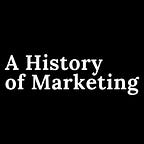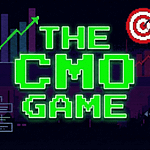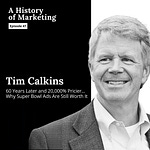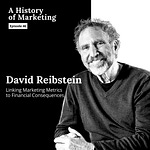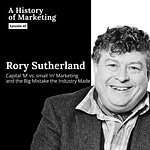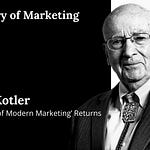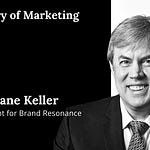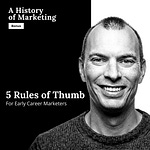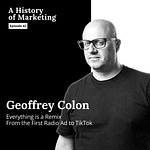A History of Marketing / Episode 15
This is not a current events podcast, but this episode is more timely than usual.
I’m joined by Gabriele Carboni, a marketer, author, consultant based in Italy. I met Carboni through Philip Kotler. Together they co-authored the book, “Enlightened Management” which is about how Impact Marketing can have a positive impact for people and the planet.
Gabriele Carboni is probably the only marketer to have a book endorsed by the late Pope Francis. The Vatican issued this comment on Carboni’s book, “Civil Economy.” (Translated from Italian)
“His Holiness encourages every reader, every business leader and every person of good will to take inspiration from this work, to transform every professional environment into a place of growth, not only economic but human and spiritual.“
Listen to the podcast: Spotify / Apple Podcasts / YouTube Podcasts
I recorded this conversation with Gabriele Carboni in February, when Pope Francis was still alive but was in the news due to health issues.
Carboni shares some great stories about meeting Pope Francis and earning an endorsement from the Pope. He also shares about what it’s like to write a book with Phil Kotler, and speaks to the rich legacy of the Italian Renaissance, Enlightenment, and Italian Humanism.
We discuss how the ideas from these eras and schools of thought influenced marketing as a field and inspired Carboni to focus on impact marketing.
Listen to the podcast: Spotify / Apple Podcasts / YouTube Podcasts
A Marketing Collaboration with Philip Kotler
Andrew Mitrak: Gabriele Carboni, welcome to A History of Marketing.
Gabriele Carboni: Hi Andrew, thank you for having me.
Andrew Mitrak: So we connected via an introduction from Philip Kotler and you recently co-authored a book with Phil. So let's start the conversation there. How did you first learn about Philip Kotler and when did you first meet him?
Gabriele Carboni: I was already beginning my company, which is a marketing company, obviously, digital marketing company. Digital marketing was my hobby and then we started a company with two business partners.
Because, of course, I was good at building websites, I was good at creating graphics, so the operational part I had. But I needed to understand the strategy better, so I bought a copy of Marketing Management. And then I read it. And then since I'm also a journalist, I was invited to Milan in 2017. Philip Kotler was speaking there. And this is a fun story because in Italy you need to be part of an association to be a journalist. It's not just you write and you are a journalist, you need to get trained and then to be part of an order, there is the order of the journalists. So you have your press badge.
So I went to the event with my badge and I said, "I am a journalist, this is my badge." Of course, I was not known as a journalist, it's not even my job. But I was there with my badge and I said, "Look, I'm a journalist, I have the badge. Can I interview Philip Kotler?" And of course they said, "Of course you cannot, because you are we don't know you, you're not in our list. So go and listen to the speech, but you're not going to meet him."
Then I said, "Okay, at least I get a free event with Philip Kotler, I'm going to listen." After the event, the event was very small, it was in a university in Milan. And I saw that there was a press room. Then I went to where there was a person on the door and I said, "Look, I'm a journalist, this is my badge. I want to interview Philip Kotler." And he said, "No, you're not on the list."
I took a look inside the room and I saw a pregnant woman who happened to be the press manager, and I told her that my wife, which was true, was pregnant too. So they were both at the seventh month of pregnancy. And we started talking, I tried to be nice with her and since, I don't know, we connected somehow. She said, "Okay, after everyone, if we have like 30 seconds, you can have a picture with him and this is the max I can do."
It happened that at the end of everything, he was drinking a coffee, eating something. I had my occasion, I had my photo with him and then we had half an hour to speak. So I happened to be the last, but I got all the time in the world and it was very nice because I gifted him my first book, which was in Italian, but he liked the approach.
I tried to explain to him an idea I had at that time which then became this card deck which actually was awarded one of the three best marketing innovations in the world in 2019 and he gave me a lot of advice. And then I asked him to write the book together and he said, "No," because, of course, he didn't know me.
Andrew Mitrak: Yeah, you're pushing your luck a little bit there. You've already gotten in, you've gotten to meet him, you've gotten a half hour and right in the first meeting you've asked him to co-author a book.
Gabriele Carboni: Exactly.
So a year later, 2018, he came to Bologna, which is near where I live, so it was easier. Still with the journalist badge. At that time I was already known by the organization, so I got an interview and I asked him again to write a book together and he said, "No."
Then in 2019, I made the card deck and again I went to visit him in Rome. It was the last time he went to Italy because after that there was COVID. And he said, "Oh, this card deck is very nice, we can do something together." And so we started to have an email exchange and we started to write something, he wrote a forward for a book on digital marketing I released. And then I went to Sarasota to visit him. And at last he said, "Okay, we are going to write a book together."
Actually, in your interview with him, he was talking about a small and medium enterprises book and that is the book we have written together, which is this one, Enlightened Management. And now it's available in English since December last year and it's going to be translated into Italian in a few months. So it was pushing my luck as you say.
Andrew Mitrak: I'm going to ask you about Enlightened Management and your work on small and mid-sized businesses. I want to ask, what is co-authoring a book with Philip Kotler like?
Gabriele Carboni: I write very fast, so in three months I wrote the first part of the book. In like three hours he replied with all the modifications. So the problem with him is he's very active, also Saturdays and Sundays, even nights. He's super fast, so I had difficulty keeping up to his timing.
Andrew Mitrak: It is amazing. At the time that you met him he must have been into his mid-80s and at the time I interviewed him he's in his early 90s and he's remarkably fast, remarkably sharp and smart and you have to keep up with him.
Getting a Book Endorsement from Pope Francis
I want to shift gears and ask about another very influential world leader that you met. Pope Francis. And we're recording this in late February of 2025 and there's been a lot of news about Pope Francis's health and we certainly wish his holiness a speedy recovery.
You are the first person I've ever met who had his book endorsed by the Pope. And I want to read this quote:
"His Holiness encourages every reader, every business leader and every person of goodwill to take inspiration from this work to transform every professional environment into a place of growth, not only economic, but human and spiritual."
And first off, congratulations on earning an endorsement from the Pope. I'm sure that's very meaningful to you.
Can you tell me the story of meeting Pope Francis and how you came to earn an endorsement from his holiness?
Gabriele Carboni: Yeah, I was invited after COVID to a very big event they had organized in Assisi, which is the city of San Francesco. There were like 1,000 young economists and marketers from all over the world, so it was very lucky to be invited. And I saw the Pope from afar. And that was the first time, but it was very exciting because it was with 1,000 people all together waiting for the Pope, it was very emotional.
And then I visited him for a private meeting the year later, so it was two years ago. And I asked him to write a forward for my book. The book was not already written and of course they replied by his office, not him in person, they replied that they were not interested.
Actually, part of that book is now Enlightened Management. So some of that content was presented to Pope Francis before Philip Kotler. It happened that I wrote a book with other very famous professors in Italy about the civil economy. And that was published by a Catholic Association. So I wrote to the Pope's offices because they said no, but they gave me their email address. Again, pushing my luck, I wrote them and said, "Hey, I have another book. It's already done, it's published by a Christian Association. Can you please write something?" And they replied with a full letter and it was crazy. It's really nice to have a comment by the Pope.
Then I met him again last year. I gave him a butterfly as a gift. And actually, Philip already knows this, but no one else knows it. I sent a copy of Enlightened Management and I asked for another comment. So I'm a lucky guy and I push it.
Andrew Mitrak: Being politely pushy, that's definitely a lesson for marketers. Just shoot your shot, right? You got to give it a try.
Can you set the scene of what it is like to meet the Pope? What are you feeling? What is the environment? Because I never will in my life, very few of us are lucky enough to meet the Pope and you're the first person I've met who met him. So what is that like?
Gabriele Carboni: Well, you are usually not alone because they are private meetings but with I don't know, 30 people, 100 people, 200 people. And he is very kind, he shakes hands with everyone. So we were 300 and everyone got a handshake and a picture with the Pope. It's like three seconds, of course. But everyone. And also he gives you a small gift, very emotional and then he always gives a lecture. Last year it was about AI, so it was very interesting.
And then you have, if you want, you can say something, like again, two or three seconds. But he's very kind, nice, and of course… holy, we can say.
Italian Humanism's Influence on Business and Marketing
Andrew Mitrak: So I want to talk about some of your philosophical background into how you became a marketer. And in our email exchange prior to this interview, you mentioned that you began your journey with exploring Italian humanism. And can you share more about what Italian humanism is and how you went from this philosophical pursuit to becoming a digital marketer and a marketing author?
Gabriele Carboni: It's about humanism. Also Philip wrote his second autobiography, My Life as a Humanist. Italians have in their background the Renaissance and humanism, which helped us a lot to think business in a different way.
One thing I've learned is that in the past, more or less where we have humanism, which was before Renaissance, companies had God as a shareholder. Meaning part of the profits were given to the community, because, of course, they didn't fire the money to God, they just gave to the community. And which is now something we do to benefit corporations or companies that have a purpose. So that intrigued me very much and I bought some books, one I have here for you, it's a book, an original book from the 1800s. And it discusses the economies of the 1700s. It was before the industrial revolution and everything was about people.
Andrew Mitrak: What was the name of this book?
Gabriele Carboni: Yeah, of course it's Italian, Economics Ideas of economists around 1848, about Augusto Graziani. I think one copy may be available in the world.
Andrew Mitrak: And for listeners, it's not some reprint. This looks like an original physical copy… very withered.
Gabriele Carboni: And I really appreciate the fact that as Italians, we always put people at the center of our business. Before the Industrial Revolution, of course, agriculture was the main business and it was a business between man and environment, which is something we are looking for now, maybe without a good success.
The Renaissance and the Ideas of Patronage and Branding
Andrew Mitrak: In our exchange, you also mentioned that Italian humanism has a direct lineage to the Italian Renaissance and that a lot of modern branding practices could be traced back to the Renaissance and Italian humanism. And if you think of things like the Medici family, which is a name that you just hold in such high regard today, centuries later, that clearly there's some branding element there. And I'm curious if you have any other examples or of branding practices that have roots in the Renaissance.
Gabriele Carboni: Well, everything in the Renaissance was related to the arts, not only paintings or statues, also music. The point was to give emotion to people and to give a sense of beauty in the cities, in the houses, the castles, even churches, of course, also the church was a very important player of the Renaissance. Everything in Rome, basically, you can see now, aside from the ancient Romans, they are from the Renaissance.
I think art is one of those elements you can use to touch the heart of people and when you do that, then people attach to your brand. In that case, the brand was the name of the family or the church itself. And that was a great branding for Medicis, for example, so great that everyone knows who they are even now. If this is not marketing, I don't know what it is.
“The Book of the Art of Trade” by Benedetto Cotrugli
Andrew Mitrak: And from this era, you introduced me to a book called The Book of the Art of Trade by Benedetto Cotrugli.
He wrote this book in 1458. And this was a fascinating book to dive into. And it's not a marketing book per se, but it covers business practices that tie into marketing. It talks about accounting, running an ethical business, and professionalizing business practices.
He even talks about the importance of merchants to have proper attire and to be well-informed about areas like cosmography, geology, philosophy, astrology, theology, and the law.
So the idea of personal branding in a way, if you're a merchant selling something, know things and just be an erudite individual, be well learned, present yourself because you want to come off as trustworthy to your potential customers and then they'll buy your products. So, not exactly marketing per se, but definitely personal branding and certainly salesmanship.
I'm curious how you came across the book The Art of the Trade and what takeaways you had from it.
Gabriele Carboni: Well, let me say that it's available also in English, so The Book of the Art of Trade, it's actually the title, the English title, so it is available on Amazon or I don't know, anywhere.
Andrew Mitrak: It's published long enough ago, it's all in the public domain too, so you can find it free online as a PDF of it, yes.
Gabriele Carboni: Good. Yes.
Gabriele Carboni: Well, it's good because again, it puts people and environment at the center. I found it because I was studying civil economy, so the economy before the industrial revolution, which is now fancy in Italy, and there are some universities teaching civil economy and one of the books they suggest is exactly this one. It also teaches you how to relate to what we now call stakeholders.
So, marketing and business in general is all about relationships. Of course, with customers or potential customers, but also with employees, talents and everything that we now call stakeholders.
The Italian Enlightenment
Andrew Mitrak: Moving on from the Italian Renaissance and some of this area, I want to also touch on the Enlightenment, or the Italian Enlightenment. And Enlightenment is very important to you, it's part of the title of your book. You know, we talked in our exchange on email about the Italian Enlightenment and when I as a somebody growing up in the United States, when I learn about the history of the Renaissance Enlightenment, the Renaissance was focused on Italy, and a lot of the Enlightenment tends to focus on the northern countries and if you even if I look at the English Wikipedia page of the Enlightenment today, you see France and Germany and England and Scotland, they're referenced a lot more and Italy's mentioned but it's not quite as prominent there.
So can you tell me about the Italian Enlightenment and what differentiates some of the Italian Enlightenment thinking of this period versus some of the other countries I mentioned?
Gabriele Carboni: Well, maybe someone will be mad about this, but we didn't have so much of enlightenment because we had humanism way before that. So Enlightenment is kind of a humanism after a few hundred years.
Andrew Mitrak: So the Italians were so far ahead of the curve, it's like you had your enlightenment centuries earlier.
Gabriele Carboni: Exactly, exactly what I mean, it's my fault if someone is mad I said that. (Laughs)
But during humanism people started to read because at that time not a lot of people could read and not a lot of people could have access to books because books were handwritten and mainly people of the church could read and could have those books, aside from some very rich noble people. And then they started to spread ahead some books about also ancient philosophy and that, of course, created a movement that then brought us to the Renaissance and then spread around the world and at one point, they invented the printed books and that helped to spread the word and I think Enlightenment it's something came before the printed books.
Andrew Mitrak: The Enlightenment and the Renaissance era might have been captured by some of the handwritten stuff, but the printing press and that changes everything as far as what's available to people and who gets the privilege of owning books and who gets to learn these ideas.
Gabriele Carboni: Principles of the Enlightenment are the same that we are reading now in civil economy. Actually, the civil economy was invented by enlightened economists in Italy. And also Adam Smith was a reader of civil economy, but then the industrial revolution pushed everything to profit and product. So we kind of forgot the person, the people and decided to go for the product and the profit.
Civil Economy Pioneers: Genovesi and Paradisi
Andrew Mitrak: And so this idea of civil economy, which you've brought up a few times, the people most associated with this are Antonio Genovesi and Agostino Paradisi. They wrote and are kind of the thinkers that are most associated with the Italian Civil Economy.
Gabriele Carboni: Exactly. Antonio Genovesi was the first in Europe, meaning maybe the first in the world, to have a course at the university about economics. So the first university course in economics was in Naples with Antonio Genovesi. And then Agostino Paradisi, who was born here where I live, it's called Vignola, it's a city called Vignola in Northern Italy, he was born right here and he had the first course about civil economy at the university of Modena.
And mainly they put people at the center again, but they gave us something that is now you can now reuse for sustainability, which is the relationship between companies, the government and the community and third sectors. So they already knew that the market it's going to be rich and prosper if companies work with the government and with the community together. They didn't have the environmental problem, of course. That is the main point.
The Arrival of “Impact Marketing”
Andrew Mitrak: Yeah. So all this tour through history of Italian humanism, the Italian Renaissance, the Enlightenment, all of this, I hope listeners have come along with us on this journey through philosophy and history and thinking, how does this tie to marketing? Well, it all sets the stage for impact marketing. you know, you've spoken about these ideas of business not just being for commerce, but being for people, that everything is kind of all connected and marketing has an impact on everything. So, this area of impact marketing is a specialization of yours. And so in your own words, could you define what impact marketing is and how it differs from traditional marketing?
Gabriele Carboni: Yeah, you can define traditional marketing as the profitable satisfaction of needs. It's the short definition, which is the one I always remember, but it is correct. So the profitable satisfaction of needs, meaning marketing cares about profit and customers. Which is kind of a small definition in today's environment.
So impact marketing instead is the strategic approach of the company, which relates to the community and the environment to create a positive impact. In this definition, profit is just a result of the positive impact of the company. So this is marketing, impact marketing. So while marketing just cares about profits and clients, impact marketing cares about all stakeholders, including the environment, to create a positive impact, which results in profits.
The Evolution of Impact Marketing
Andrew Mitrak: Thanks for that definition. And how has impact marketing evolved as a field over the years? Or when do you feel like impact marketing first entered the lexicon of marketing and how is it moved over time?
Gabriele Carboni: I defined impact marketing when I was reading civil economy, studying civil economy. Since economics is a big field, I wanted to bring some of the ideas to marketing, which is maybe more modern than economics, at least in my industry. And then I brought those concepts to marketing and it was just a few years ago. More or less during COVID, which was also in some ways the better environment to start an idea like that where we have seen people care more about other people, about the environment and so on.
Andrew Mitrak: The reason I'm kind of asking about how it's evolved is these ideas of companies doing good not just for their shareholders, but also for the environment. It's something that I feel like has probably ebbed and flowed over time. And Phil Kotler himself wrote the book Broadening the Concept of Marketing and has social marketing ideas and economists have also pushed back on this over time. There was somebody in America named Milton Friedman and he would argue that the social responsibility of business is to increase its profits and almost like nothing else. And so then there's also ESG is kind of being part of companies as well and there's been almost a push and pull, I think, between companies purely focusing on their bottom line and returns to shareholders and then these ideas of, well, what else can a company be doing as well? And then not just what the company could be doing, but could marketers within that company be doing? And so it just seems like there's always been kind of a push and pull, at least for the last several decades or so, between the social responsibilities and impacts marketing and businesses should have.
Gabriele Carboni: I always use this analogy of the butterfly. Companies are like caterpillars: they go from leaf to leaf to find new customers, new profit and to evolve themselves. But they don't know they will evolve into a butterfly. And that's good because caterpillars need to live, to sustain themselves. Of course, the first sustainability is the financial one.
And then they evolve. They create the chrysalis, we can say they start recognizing their values and they create this chrysalis with values. And at a later stage, they evolve into a butterfly and they start flying around and they see there is not only that tree with only leaves, they see they are part of an environment and then they discover they can relate to that environment. So this is mainly the concept of impact marketing and enlightened management.
Real-World Examples of Impact Marketing
Andrew Mitrak: I love that analogy because if we if you think of yourself as a small business, of course, you want to do good for the world, but to do that you have to sustain yourself and earn some profit, so you need to evolve over time to be able to have the full positive impact on the world that you'd like.
I'm wondering if you have any examples of either impact marketing in action or businesses that have kind of gone this caterpillar to butterfly journey and started one way but evolved to really embrace impact marketing as they grew. What are some of your examples of impact marketing in action?
Gabriele Carboni: Well, of course, benefit corporations. In the US and some other countries like Italy, you can have a benefit corporation. My company is a benefit corporation, meaning as a company it is written that we aim for profit, but also we have some sustainable goals and we need to achieve that year by year and they have the same value as the profit goals. So, for example, my company gives 20% of the net profits to community projects. And that's an example.
And we have the B Corps, so those companies, mainly big companies, that are B Corp certified. And many companies, and this is one point, many companies already do a lot of good, they generate a positive impact, but they do not communicate it. And this is very true for small and medium enterprises. They always donate something, they support some community local causes and they do not share the good they do, which can be good. But if you share what you do, then other companies can bring your example and do the same.
Andrew Mitrak: Yeah, I think of examples of companies that have done that successfully like there was this shoe brand called Tom's Shoes and they were very popular, probably especially 15 years ago, they were really at their peak or that was around the time they launched and they really brought attention to the importance of shoes for the poor or specifically for shoes in regions of Africa. And there was this idea of buy a pair, give a pair. And that their relatively low cost made shoes but they were sold at a premium price and the premium that you're paying is as a consumer is understanding I'm supporting a good cause, I'm supporting shoes for the world, I'm willing to pay for these and it almost became a social status symbol in a way. Like I'm wearing these Tom's shoes, I'm not wearing some big fancy other designer shoes, I'm showing that I care about a cause and it made, Tom's a more popular brand, it also brought more attention to this issue, and consumers benefited in that they got to wear shoes and signal to others that they care about causes like this.
Gabriele Carboni: Yeah. Another example could be Patagonia, which is very well known around the world, maybe the first B Corp. Yes, many big brands like Danone even are B Corp certified and you can read everywhere what they do. I know Danone very well in Italy and they do a lot of great projects for the positive impact.
Obstacles to Implementing Impact Marketing
Andrew Mitrak: When it comes to other companies adopting impact marketing, what are some of the biggest challenges or obstacles that need to be addressed for impact marketing to be more widely adopted?
Gabriele Carboni: Well, it's the mindset. For those who already do charity or are already active in their community, it's to start communicating. Also because customers care more and more about products. Even if it's B2B, they're starting to care about suppliers that care about sustainability. This is also forced somehow in Europe because big companies need to share their sustainable report, for example. But also many companies ask for the ESG rating for their suppliers. And customers prefer to buy sustainable products. So that is one point.
Another point is that many companies think that sustainability is a cost instead of an investment. Now we already have a lot of studies saying that sustainability is not a cost, it is an investment and there is a return of investment even shorter than we thought before.
Enlightened Management: Impact Marketing for SMBs
Andrew Mitrak: I want to come back to your book Enlightened Management and how marketers, especially small business marketers and entrepreneurs can really apply impact marketing from the start. And this book is all about how to take these ideas of impact marketing and apply them for small and mid-sized businesses. I love this area because I've been a small business owner myself, I came from a family of small businesses, my professional work today is about marketing products to small businesses. And I just think that this is a really cool idea of how do you build a business that has social good and thinks about long-term impacts beyond just your profitability right from the start as you're building and founding and growing your business. So why did you focus on small businesses and what are some of the top lessons and takeaways that you have for small businesses and entrepreneurs?
Gabriele Carboni: Well, big companies, they have more money and they are somehow forced or anyway invited by governments to do something. So they are already on the path of sustainability at least. And you can also think about Unilever with Paul Polman that brought the purpose at the center of every product. Small companies as said, they usually don't have the mindset or the money to start this kind of new way of marketing and of business. So we tried to give practical advice in the book. There is a whole chapter, a whole part about tools that small and medium enterprises can use.
One concept I want to bring you is the concept of the new P's of marketing. So we have redefined the four P's, which are product, price, place, and promotion, of course, thinking about just one P, which is people, to the third power. So it's going to be People X Purpose X Planet, which equals prosperity. It works very well, it's also on the cover of the book. “People, purpose, planet” and P cubed. It works even better in Italian because people to the third power, we say people elevated to the third. I don't know if you say it also in English, but we say elevated. So meaning that people is the person is elevated if they work with purpose and it works for the planet.
Andrew Mitrak: I see what you're saying because it's people and to the third power, the three would be elevated on top of it. We don't use that term, but I can visualize exactly what you're describing. Like just another example of the Italian language being much more poetic and pretty than English.
The Importance of Purpose and Action
Andrew Mitrak: Are there any other takeaways for marketers and entrepreneurs into really applying this into practice or if somebody is a marketer who's listening to this today and they're inspired by some ideas of enlightened management, what could they do as a daily activity or is there planning their next marketing campaign to bring some of these ideas into their work?
Gabriele Carboni: Well, something that was very difficult for me was to find my purpose. And it took me a lot of time. I explained it in another book, but there are those nights you cannot sleep because your brain still works. And I understood that my purpose was to help companies to function differently, to do business differently. This is because my father had a small company and he was one of those who focused on the product. It was a car repair garage and he was always focusing on the car. And the car was perfect, everything was great and you could trust that company that your car was perfect every time. But they forgot about the people who drive that car. So they were always late, they were not treating employees very well. And so I wanted to explain to companies that you can do business differently. So one thing is if you can find your purpose, you wake up every morning knowing what you are doing and why you are doing that. I think everything will be easier.
Andrew Mitrak: I can relate, and I think everybody can relate, to those nights as you're thinking, “Am I doing the right thing with my life?” Even when you feel like you're successful, or you had what you thought you wanted, that time passes and you kind of get restless or you think of second guess things. I found that becoming a father and having kids also changed my perspective on a lot of things too. I think about the planet they'll inherit, the types of companies they'll work at, the types of jobs they'll have, and how you want them to spend their time. So it is something that. Thanks for sharing that was part of it because I certainly relate to it and I think listeners relate to that as well.
Gabriele Carboni: Yeah. And I always follow Yoda's quote, which is, “Do or do not, there is no try.”
Andrew Mitrak: You're totally right and you've exemplified it by asking Philip Kotler to co-author a book the first time you met him, asking the Pope for your endorsement. I think also even for me I relate to it somewhat on this podcast. You think about the things you want to do, the projects you want to do, and you're like, I can think about it, but how about I just do it? How about I just send Philip Kotler an email and see if he wants to talk? And then sometimes he will say yes and the universe pulls you in a direction or gives you a signal that you should keep kind of pulling on that thread and exploring those ideas.
We've gotten very philosophical here…
I've really enjoyed speaking with you. It's been so much fun going back from Italian humanism, the Renaissance, the Enlightenment. How all of these ideas from 500 plus years ago can impact how we think about marketing, what we choose to prioritize. And also I just loved hearing your stories both about meeting Phil Kotler and Pope Francis and it's just been a really fun conversation.
Where can listeners find you online and how can they learn more and support your work?
Gabriele Carboni: Well, LinkedIn is the best way to reach me. I always respond also to direct messages, so if you have any questions, just write to me and I'll reply.
Andrew Mitrak: Thanks so much for your time, I've really enjoyed the conversation and I look forward to staying in touch.
Gabriele Carboni: Thank you very much.


